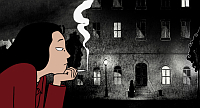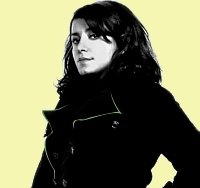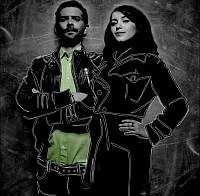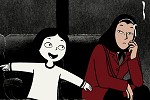 Not quite my life
Not quite my lifeA conversation with Oscar nominee Marjane Satrapi




MARJANE SATRAPI
22 November 1969 in Rasht, Iran
Books in English...
Persepolis: The Story of a Childhood (2003)
Persepolis 2: The Story of a Return (2004)
Embroideries (2005)
Chicken with Plums (2006)
Monsters Are Afraid of the Moon (2006)
Awards for Persepolis...
Cannes Film Festival 2007: Jury Prize
London Film Festival 2007:
Sutherland Trophy
Vancouver Film Festival 2007:
Most Popular Film
Sčo Paulo Film Festival 2007:
Audience Award
Manila Film Festival 2007:
Special Jury Prize
Rotterdam Film Festival 2008:
Audience Award, MovieZone Award
European Film Awards 2007:
Best Film nomination
Annies 2008:
Directing and Writing nominations
Étoiles d'Or 2008: Best First Film
Césars 2008:
Best First Film, Adapted Screenplay;
also Best Film nomination
Independent Spirits 2008:
Foreign Film nomination
Oscars 2008:
Animated Feature nomination

 Named after the ancient capital of Persia, the film Persepolis has won awards from festival juries, critics groups and professional guilds, capping it off as France's official nominee for the foreign film Oscar (although it was instead nominated in the animated feature category).
Named after the ancient capital of Persia, the film Persepolis has won awards from festival juries, critics groups and professional guilds, capping it off as France's official nominee for the foreign film Oscar (although it was instead nominated in the animated feature category).To call this an unusual subject matter for an animated movie is a bit of an understatement. This is a semi-autobiographical tale by writer-codirector Marjane Satrapi (38), who was raised in Tehran by a progressive family that was involved in the communist and socialist movements. At age 15 she was sent by her parents to Vienna to escape the increasingly fundamentalist regime. She returned to Iran for university, where she studied visual communication, then later moved to France. Her story was originally published in a series of graphic novels, and she worked with French comic artist Vincent Paronnaud to turn it into a film, which premiered at Cannes in 2007, winning the Jury Prize.
Did it feel strange to cooperate with Vincent on such a personal story?
Satrapi: We were sharing the same studio, and we knew each other very well. So when I wanted to make this movie, I said, 'Do you want to make the movie together?' And he said, 'Yes!' I didn't want to work him because of some technical competence -- because he didn't have any! He had made one short movie, but it was a five-minute movie, and has nothing to do with what we did. It was for his experience and talent that I wanted to work with him. He's a great artist.
And after creating your books on your own, you worked with a team of animators on the film.
Satrapi: I always thought directing an animated movie would see me go there two times a week, yell at everybody, and then they do the work and I become rich and famous! Well, this is bulls**t. It doesn't happen. If you want quality, what happens is that you have to be there before everybody. The whole time, people working with you have questions. You have to be there to answer to them. So that means the time you have for doing your own work as a director is when everybody else is gone. That means late at night and during the weekends -- so that was how it was.
How did you guide them?
Satrapi: The voices of the actors were taped before. So first of all, the animators had something to listen to that would give some indication. But then also, I played each character in front of the animator. And they filmed it, so they had a reference how the character should move.

We tried to keep the studio clean
but by the end, the office looked like a gypsy camp!
Satrapi: We tried to keep the studio clean but by the end, the office looked like a gypsy camp! My studio has always been like a gypsy camp. I always work in the middle of lots of crap! Things were hanging everywhere, people were making tea and coffee right by where they worked -- it was a whole mess. And then we finished it, and the studio disappeared with us.
Was it difficult to get Catherine Deneuve to voice a character?
Satrapi: No, it was very easy. I had heard that she liked my work, so we sent her the script. She liked it. It was not very difficult. And she was a true professional. I was very scared of Deneuve. I was drinking cognac after cognac beforehand to stay calm. But then you have to also be a professional. She's there to play and role and you are there to direct her.
And what about Deneuve's daughter, Chiara Mastroianni?
Satrapi: Actually, I didn't choose her. She chose us. This role that she has is very difficult. She has to do the narration, and then be an adolescent and then an adult. She was in her mother's house of and saw the script -- she was already familiar with the book -- so she called me. She's a very shy person -- I don't know how that happened -- but she asked if she could try out.
How did you decide to turn your novels into a film?
Satrapi: I didn't decide -- it just happened this way. Making a movie was not the next step for me as an artist; I don't think making a movie is more exciting than making comics. If I hadn't had this friend who wanted to become the producer, probably I would never have made it. It was a situation where I had the possibility of making the movie and I could do it the way I wanted. So I just took the chance to make it. But it was not a big wish of mine to make the movie – it just happened.
Did the idea of reaching a wider audience appeal to you?
Satrapi: It's not the way I think about working. I never think about how many people I will reach. I just want to make honest work, where I can enjoy myself, tell stories and do it the best way I can. Of course, the public is important to me. But I want the public to understand what I do. I've made murals in my life, I've written articles, I've done press illustrations, I've made things for fashion magazines. And this was a time that I could make the movie, so I made it. There was nothing calculated in it. This is not the 'next step'. It's not a progression -- not at all. This is part of a large creation that I made, but it's not that making a movie is progress. I could've started with the movie and then made comics.

I never think about how many people I will reach.
I just want to make honest work.
Satrapi: It's the story of a life, but it's not my life story. Of course, it's not a documentary about my life. It's based on my experiences, but you should never forget the part of storytelling in the story. It's not just, 'This is how my life was.' Clearly, when you make a story you have to emphasise some stuff. You can't just go in any direction. So the turning point in this movie is the exile, with somebody who is extremely nostalgic about where they came from. The whole story is about someone who goes into an airport and cannot go back to her country. So she sits in the airport and remembers what she's gone through. This is the turning point.
Would you consider this an autobiography?
Satrapi: No, I don't like that term. An autobiography is a book that people write to solve the problems with people around them, with their family and friends. They don't dare to say things to them, so they decide to write in revenge! That is not what I did. It's based on my experiences, and I use myself as the protagonist to be able to talk about the world around me. It's a very subjective point of view. I didn't want it to become a movie with the pretensions to become this lesson of history, of politics, of sociology. I'm not a sociologist. I'm not a politician. I'm not a historian. I'm one person. If you start with one person, this one person is very universal. Tolstoy used to say, 'If you want to talk to the world, write about your village.' This is the way it is. What I am looking for is to ask the question, not to give the answer. I'm trying to show a certain aspect of reality.
Do you know if the film has been seen in Iran?
Satrapi: They told me that there are DVDs. One guy has been filming it with his mobile phone! I have been told, but I don't know more than that. It's been eight years since I was last in Iran. It's a question of distance. I have the life that I want. I live where I want. I do the work I want. And if I complain, then what do the rest of the people do? As a human being, you have to have a little bit of distance.
THANKS TO BOLA AT GREENROOM • Apr.08
HOME | REVIEWS | AWARDS | NEWS | FESTIVAL | Q&A | ABOUT | TALKBACK
